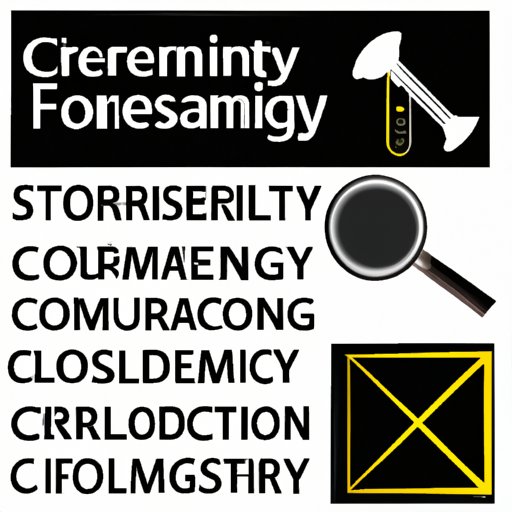Introduction
Forensic science is a field of study that applies scientific knowledge to criminal investigations. It involves the use of physical evidence, such as fingerprints, DNA, and other materials, to determine the cause of death or to identify suspects in a crime. Forensic science has become increasingly important in solving crimes, and it is now an integral part of the criminal justice system.
The question then becomes, what major would forensic science be under? This article will explore the core curriculum of forensic science majors, the different disciplines within the field, and the various programs across universities. It will also offer tips on how to choose the right program and prepare for a career in forensic science.
Exploring the Core Curriculum of Forensic Science Majors
Forensic science majors typically take courses in biology, chemistry, physics, mathematics, and computer science. They may also take classes in law, criminology, psychology, and other related fields. Common courses include criminalistics, forensic anthropology, forensic toxicology, forensic document examination, and forensic photography.
In addition to these core courses, many forensic science majors specialize in a particular area. For example, some students may focus on digital forensics, which involves the use of computers and technology to collect evidence from digital devices. Others may specialize in pathology or entomology, which involve studying diseases or insects, respectively. Finally, some students may specialize in DNA analysis, which involves analyzing genetic material to identify individuals or determine paternity.
What Can You Do With a Degree in Forensic Science?
A degree in forensic science can open up a variety of career opportunities. Many graduates go on to work as forensic scientists in laboratories, where they analyze evidence and present their findings in court. Other graduates may become crime scene investigators, medical examiners, or police officers. Some even go on to pursue graduate studies in forensic science.
Salary expectations for forensic science professionals vary depending on experience, education level, and location. According to the Bureau of Labor Statistics, the median annual wage for forensic science technicians was $61,220 in May 2020. The highest 10 percent earned more than $99,850, while the lowest 10 percent earned less than $35,770.

A Guide to Choosing the Right Major for Forensic Science
When choosing a major for forensic science, it’s important to consider the advantages and disadvantages of each option. For example, a major in biology or chemistry may provide a thorough understanding of the scientific principles behind forensic science. However, these majors may require a large number of courses in math and science, which may not be the best choice for those who want to pursue a career in forensic science but don’t have a strong background in those subjects.
On the other hand, a major in criminal justice or psychology may provide a more comprehensive overview of the criminal justice system and the psychological aspects of crime. These majors may also provide more opportunities to gain practical experience through internships or research projects. Ultimately, the best major for forensic science depends on the individual’s interests and goals.

How to Prepare for a Career in Forensic Science
Gaining experience is key to preparing for a career in forensic science. Students should look for internship or volunteer opportunities at laboratories, crime scenes, or crime labs. These experiences can help students develop the skills necessary to succeed in the field, such as problem-solving, critical thinking, and data analysis.
In addition to gaining experience, students should also work on developing their communication and writing skills. Written reports are often required in forensic science, so having strong writing abilities is essential. Finally, students should take advantage of any resources available to them, such as online courses or professional development seminars.
Navigating the Different Disciplines of Forensic Science
Forensic science is a broad field that covers many different disciplines. These include forensic biology, forensic chemistry, forensic psychology, and forensic engineering. Each discipline has its own set of skills and knowledge, and it’s important to understand the benefits of each one before deciding on a major.
For example, a student interested in forensic biology may benefit from taking courses in genetics, biochemistry, and molecular biology. A student interested in forensic engineering may benefit from taking courses in physics, engineering, and computer science. Understanding the different disciplines of forensic science can help students make an informed decision about which major is best for them.

A Comparison of Forensic Science Programs Across Universities
Choosing the right university for a major in forensic science can be a daunting task. Fortunately, there are several ranking systems that can help students compare different programs. U.S. News & World Report ranks colleges and universities based on criteria such as faculty resources, financial resources, student selectivity, and graduation rates.
In addition to rankings, students should also research popular programs across universities. For example, the University of Florida offers a Bachelor of Science in Forensic Science, which is one of the most popular programs in the country. Other popular programs include the University of California, Davis’ Master of Science in Forensic Science and the University of Illinois at Urbana-Champaign’s Ph.D. in Forensic Science.
Conclusion
In conclusion, this article explored the different disciplines and programs of forensic science, as well as what major it would be under. It offered tips on how to choose the right program and prepare for a career in forensic science. When selecting a major, it’s important to consider the advantages and disadvantages of each option, as well as the different disciplines within the field. Additionally, ranking systems and popular programs can help students compare different schools and programs. Ultimately, the right major for forensic science depends on the individual’s interests and goals.
(Note: Is this article not meeting your expectations? Do you have knowledge or insights to share? Unlock new opportunities and expand your reach by joining our authors team. Click Registration to join us and share your expertise with our readers.)
